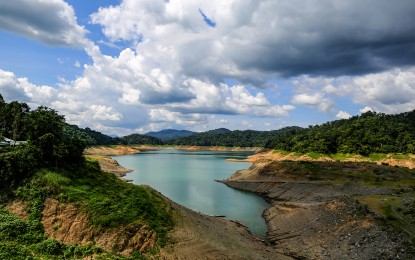
LESSER WATER. The level of Angat Dam, which provides potable water to majority of Metro Manila and nearby provinces, continues to drop as El Niño nears. As of Sunday morning (Feb. 25, 2024), the Bulacan dam is 5.55 meters below the normal level of 2.12m. (PNA file photo by Joan Bondoc)
MANILA – Surigao del Norte Rep. Robert Ace Barbers on Sunday called for the approval of a bill he filed more than a year ago seeking mandatory installation of rainwater collection systems (RCS) in new residential and commercial buildings, particularly in urban or densely-populated areas.
With the advent of the El Niño, the lawmaker from Mindanao is calling for the passage of House Bill (HB) No. 4837 mandating the installation of RCS, primarily to promote sufficient water supply during the extreme dry weather phenomenon and to reduce flooding in urban areas in times of La Niña.
“The global extreme weather conditions apparently due to climate change prompted the idea of calling for the mandatory RCS installation in all residential, commercial and institutional buildings that would be built in the future,” he said in a news release.
Barbers explained that RCS shall mean a facility designed to capture, retain and store rainwater flowing off a building, parking lot or any other man-made, impervious surface, for subsequent onsite use.
He said the RCS concept is not new in the country, particularly in rural areas with limited water supply, where pipes or diverters connected to big barrels are used to collect and store rainwater.
“But in urban or densely-populated areas like Metro Manila, people put little to no emphasis on rainwater collection due to the presence of service companies like Maynilad and Manila Water that provide stable and abundant water supply,” he said.
But with the onset of El Niño, Barbers said the water levels of dams continue to evaporate and decline due to extreme heat and may soon cause water service interruptions due to the great demands compared to the minimal supply of water.
As per the monitoring on Sunday morning, all dams are below the normal high water level.
San Roque dam, spanning the municipalities of San Manuel and San Nicolas in Pangasinan province, has the biggest deviation at 36.66 meters.
Under the revived HB 4837, which was filed on Sept. 14, 2022, the measure compels the owner or developer of new residential, commercial and institutional buildings to include in its building plan an RCS; while local government units (LGUs) and the Housing and Land Use Regulatory Board are mandated to deny construction permits of such edifices that are without an RCS in their designs or plans.
The Department of Public Work and Highways, through its concerned attached agencies, would be required to install RCS in all new government buildings and shall supervise the filtration and purification process to ensure that the stored rainwater is safe for drinking.
Barbers said private institutional buildings such as private schools and universities, including large commercial establishments like malls, supermarkets, and companies, will be required to install rainwater filtration facilities connected to an RCS for onsite use as potable water.
Property owners who comply with RCS installation would be extended a 10 percent tax credit of their total real property tax but not exceeding PHP10,000.
The LGUs, through their engineering office, shall inspect and issue certifications, which would be used by the property owner as proof for tax credit purposes, on RCS installation compliance.
Under the bill, property owners who fail to comply with RCS installation would be penalized PHP100,000 but not more than PHP500,000, for every year of non-compliance.
Any government officer or employee found to have violated the act’s provisions would be suspended for not less than 10 days but not more than 180 days after due notice and hearing in an administrative proceeding.
HB 4837 has been pending with the House Committee on Public Works and Highways since its first reading on Sept.19, 2022. (PNA)
